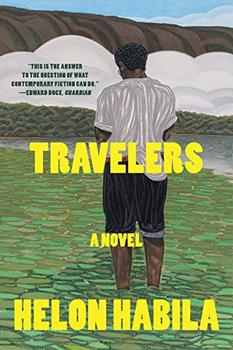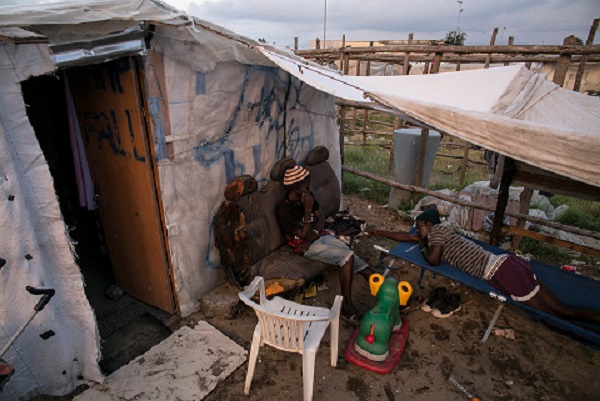Summary | Excerpt | Reviews | Beyond the Book | Read-Alikes | Genres & Themes | Author Bio

A Novel
by Helon HabilaThis article relates to Travelers
 According to the UN Refugee Agency, over 40,000 refugees arrived in Europe in the first seven months of 2019, the vast majority from the war-torn nations of Afghanistan, Syria, Morocco and Iraq. Another 668 have died or gone missing on their journey. The total number of arrivals for 2018 was 141,472, with 2,277 dead or missing. While these numbers are alarmingly large, they are a fraction of the totals from 2015 when the crisis reached its peak and over one million refugees sought shelter in Europe, with 3,771 dead or missing (which is in itself a fraction of the total number of over 16 million people who have been displaced by post-9/11 conflicts). In addition to those from the Middle East, the Pew Research Center, reports nearly one million sub-Saharan Africans applied for asylum in Europe between 2010-2017 (along with the hundreds of thousands that have migrated illegally). These statistics are staggering, and also vaguely impersonal, but books like Helon Habila's Travelers, centered around the experiences of African refugees and immigrants, put a human face on the issue and establish empathy where it is sorely needed.
According to the UN Refugee Agency, over 40,000 refugees arrived in Europe in the first seven months of 2019, the vast majority from the war-torn nations of Afghanistan, Syria, Morocco and Iraq. Another 668 have died or gone missing on their journey. The total number of arrivals for 2018 was 141,472, with 2,277 dead or missing. While these numbers are alarmingly large, they are a fraction of the totals from 2015 when the crisis reached its peak and over one million refugees sought shelter in Europe, with 3,771 dead or missing (which is in itself a fraction of the total number of over 16 million people who have been displaced by post-9/11 conflicts). In addition to those from the Middle East, the Pew Research Center, reports nearly one million sub-Saharan Africans applied for asylum in Europe between 2010-2017 (along with the hundreds of thousands that have migrated illegally). These statistics are staggering, and also vaguely impersonal, but books like Helon Habila's Travelers, centered around the experiences of African refugees and immigrants, put a human face on the issue and establish empathy where it is sorely needed.
European leaders with anti-immigration platforms have worked to stem the tide of refugees, with increasingly stringent restrictions. In June 2018, a boat carrying 629 migrants (including 100 children) was left to float in the Mediterranean Sea for days as the Italian and Maltese governments quibbled over allowing them entry. Italy's deputy prime minister Matteo Salvini has argued against accepting refugees at every turn with his "Italians first" ideology, even ordering the bulldozing of a refugee camp in San Ferdinando in March 2019 (a similar bulldozing occurred in October 2016 in Calais, France, which is just across the English Channel from the U.K.). Hungary's border has been closed since 2015, the same year Slovenia began construction on a razor-wire border fence that is manned by military personnel. Anti-immigrant ideologies like Salvini's are disseminated in part through dehumanizing portrayals of refugees.
A 2017 study by Humanitarian Emergencies scholar Annabelle Cathryn Wilmott analyzed depictions of refugees in the U.K. media and discovered that the majority of photographs show refugees in large groups, and often while being confronted or assisted by military or police. These depictions cause a remove between the viewer and the subject. It is more difficult to feel a direct connection to a mass of people as opposed to a single human being, particularly if that mass of people is being corralled by authorities in uniform, as this creates the implication that they have done something wrong. Furthermore, Wilmott found that men were shown in pictures more than women, despite the fact that there are more female refugees than male (and the women are often accompanied by their children). Large groups of men appear threatening, and Wilmott argues that, by depicting the refugees in this manner, the U.K. press intentionally dehumanizes them. The Washington Post notes that the language used when discussing refugees is just as important as the visual imagery. For example, describing a group of people seeking asylum as a "swarm" is incredibly dehumanizing, and the same goes for the word "illegal" used as a descriptor for a person. (The Library of Congress has recently opted to remove the phrase "illegal aliens" from its cataloging system.)
The EU struck a deal with Turkey in March 2016 that involved paying the nation to take in Syrian refugees, which can be seen as a crass way for European nations to essentially ship these "undesirables," out of sight, out of mind. In Greece, refugees are kept in camps with abysmal conditions. One inhabitant explained to Amnesty International, "Every day we die 100 times here; the air is no good here, the food is not good, there is infection here. Even animals could not live here." Amnesty International also notes that ten countries accounting for just 2.5 percent of the world's GDP are caring for more than half of the world's refugees, while the wealthier nations continue to restrict the number of individuals permitted into the country. Nevertheless, a great majority of Europeans support welcoming refugees into their countries, albeit with some caveats. In a survey taken by the Pew Research Center, 56 percent of Italians stated they would approve of the nation taking in refugees fleeing from violence/war, while 32 percent opposed. In Spain, 86 percent of people approved, in Germany 82 percent, and 74 percent in the U.K.
One refugee living in the camp in Calais captured the effects of dehumanization succinctly in an interview with the Guardian: "It's easier to leave us living like this if you say we are bad people, not human." But as Habila's Travelers establishes, these refugees are usually just people in crisis seeking a better life for themselves and their families.
San Ferdinando migrant camp, courtesy of Sean Smith for the Guardian
by Lisa Butts
Filed under Society and Politics
![]() This "beyond the book article" relates to Travelers. It originally ran in August 2019 and has been updated for the
August 2020 paperback edition.
Go to magazine.
This "beyond the book article" relates to Travelers. It originally ran in August 2019 and has been updated for the
August 2020 paperback edition.
Go to magazine.






Your guide toexceptional books
BookBrowse seeks out and recommends the best in contemporary fiction and nonfiction—books that not only engage and entertain but also deepen our understanding of ourselves and the world around us.